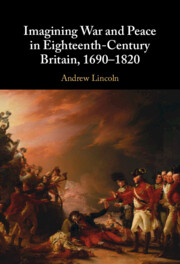Book contents
- Imagining War and Peace in Eighteenth-Century Britain, 1690–1820
- Imagining War and Peace in Eighteenth-Century Britain, 1690–1820
- Copyright page
- Dedication
- Contents
- Figures
- Preface
- Introduction
- Part I Developing Ideals
- Chapter 1 The Culture of War and Civil Society, from William III to George I
- Chapter 2 War and the Culture of Politeness
- Chapter 3 Sacrifice
- Chapter 4 Sacrifice
- Part II Developing Questions
- Part III War and Peace in an Age of Revolutions
- Part IV The Landscape of Conquest
- Further Reading
- Index
Chapter 2 - War and the Culture of Politeness
The Case of The Tatler and The Spectator
from Part I - Developing Ideals
Published online by Cambridge University Press: 10 January 2024
- Imagining War and Peace in Eighteenth-Century Britain, 1690–1820
- Imagining War and Peace in Eighteenth-Century Britain, 1690–1820
- Copyright page
- Dedication
- Contents
- Figures
- Preface
- Introduction
- Part I Developing Ideals
- Chapter 1 The Culture of War and Civil Society, from William III to George I
- Chapter 2 War and the Culture of Politeness
- Chapter 3 Sacrifice
- Chapter 4 Sacrifice
- Part II Developing Questions
- Part III War and Peace in an Age of Revolutions
- Part IV The Landscape of Conquest
- Further Reading
- Index
Summary
This chapter shows how the two most influential periodicals of Queen Annes reign, The Tatler and The Spectator, reacted to the perceived threat posed by the sometimes chaotic representation of contemporary battles in the newspapers, by offering readers fictionalised and idealised alternatives. This strategy was compatible with the attempts of their authors (mostly Richard Steele and Joseph Addison) to encourage politeness. War is seen to encourage disinterested sociability while the career of soldiering is seen to promote good manners. In the face of growing criticism of the bellicose aspect of European cultural heritage, the periodicals attempt to distinguish morally useful representations of violence from aristocratic codes of honour and from sensational barbarism.
- Type
- Chapter
- Information
- Publisher: Cambridge University PressPrint publication year: 2023

